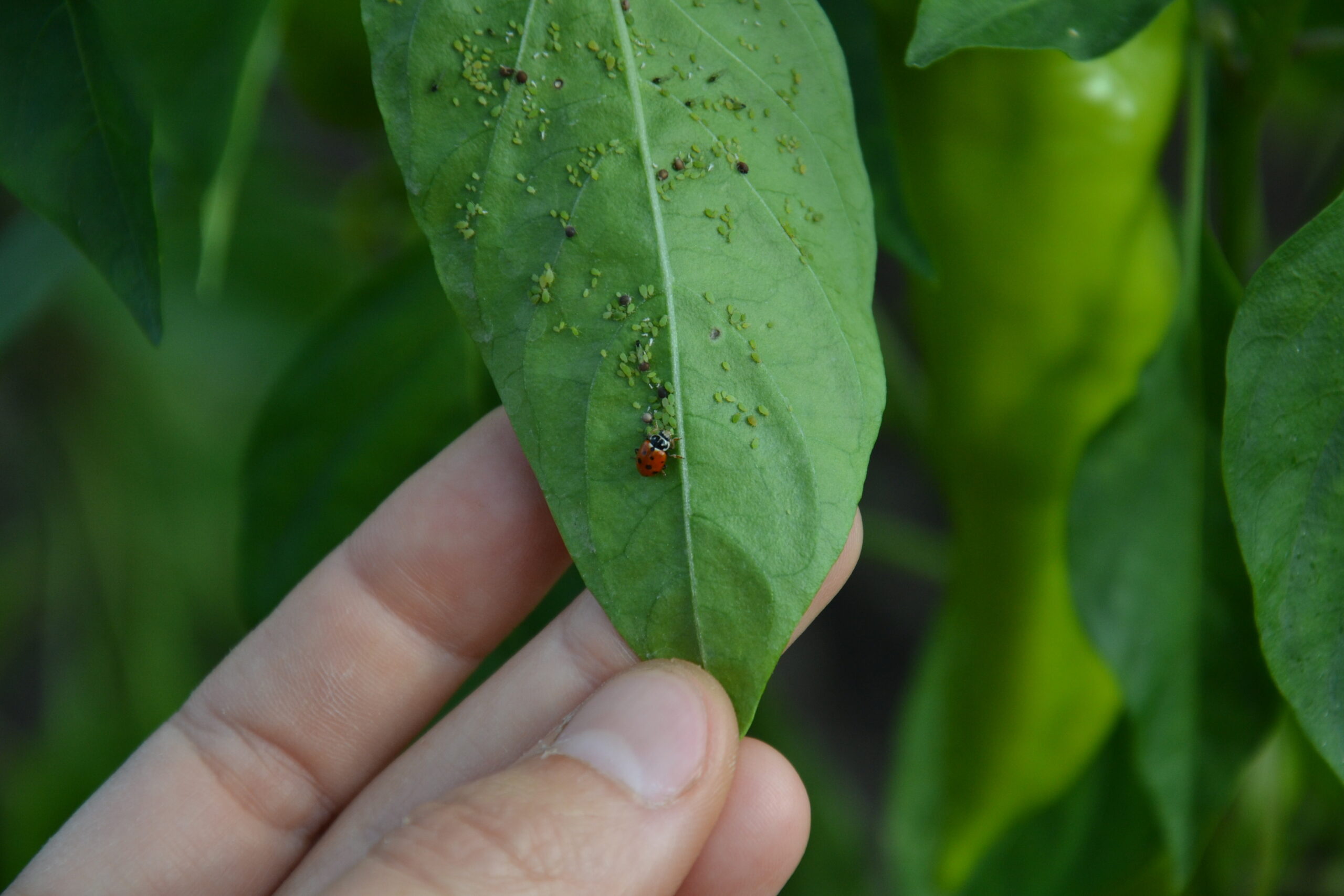The Shift Toward Biological Pest Control
Across the globe, growers are under increasing pressure to reduce chemical pesticide use. Stricter regulations, consumer demand for sustainable food production, and concerns over resistance development are pushing Integrated Pest Management (IPM) strategies to the forefront. As a result, biological controls—beneficial insects, predatory mites, and microbial solutions—are becoming essential tools in greenhouse pest and disease management.
Using biologicals supports sustainability, promotes healthier crops, and minimizes environmental impact. And for many growers, spraying chemicals is now a last resort. However, while the benefits of biologicals are clear, the real-world challenges of implementation can make their success inconsistent. The effectiveness of biologicals depends on multiple factors—product quality, application timing, compatibility with other organisms, and overall cost-effectiveness.
This is where IPM Scoutek steps in, providing growers with a data-driven, unbiased approach to optimize biological control strategies, ensuring they are used effectively and within budget.
The Challenges of Using Biologicals in Greenhouse IPM
Quality Issues: Not All Biologicals Arrive in Peak Condition
Unlike chemical pesticides, which have a more predictable shelf life and potency, biological control agents are living organisms, highly sensitive to handling, storage, and environmental conditions. Several factors can significantly impact their quality before they even reach the crop:
- Shipping and Transportation Conditions – Biologicals require strict temperature control during transport. If they are exposed to heat, cold, or extended transit times, their effectiveness is greatly reduced.
- Storage and Handling at the Greenhouse – Even after arrival, incorrect storage (temperature, humidity, exposure to light) can weaken or kill beneficials before they are released.
- Viability on Arrival – Some biologicals may arrive in a weakened state due to poor rearing conditions or delays in distribution, reducing their ability to establish in the crop effectively.
- Batch-to-Batch Variability – Unlike synthetic chemicals, biological products can have natural variations in quality, potency, and performance.
Without reliable data tracking, these issues can lead to poor results—and growers often don’t realize there’s a problem until it’s too late.
Timing is Everything: The Risks of Deploying Biologicals Too Late
The success of biological control relies on early intervention and preventative action. Introducing beneficial insects and microbes after pest populations have already exploded significantly reduces their effectiveness. Some key risks include:
- Delayed Action = Increased Damage – If pests are already at high levels, biologicals often can’t control them quickly enough, leading to crop losses or requiring a chemical rescue treatment.
- Too Late for Establishment – Many beneficial insects need time to build populations before they can control pests effectively. If they are introduced too late, they may fail to establish and provide lasting protection.
- Inconsistent Release Timing – Without structured monitoring, growers may apply biologicals sporadically or reactively instead of strategically. This leads to inconsistent control and higher costs.
IPM Scoutek ensures real-time monitoring, providing alerts and tracking pest population trends so growers can introduce biologicals at the right time, not when it’s already too late.
Biological Compatibility Issues: Not All Allies Work Together
Using multiple biologicals sounds great in theory, but in practice, it’s not always that simple. Many beneficial species have incompatibilities with each other or with other IPM tools. Some key challenges include:
- Predator-Prey Conflicts – Some beneficial insects will attack other beneficials instead of the targeted pests.
- Environmental Preferences – Different biologicals thrive under different temperature and humidity conditions. Using the wrong combination can reduce effectiveness.
- Chemical Residue Sensitivity – Some biologicals are highly sensitive to chemical residues from previous pesticide applications, reducing their ability to survive and work effectively.
- Short Lifespan & Reapplication Needs – Some species have short lifecycles and require frequent releases, adding to costs if not managed properly.
IPM Scoutek helps track application history, ensuring growers make the right choices for their IPM programs.
Cost & ROI Concerns: Are Biologicals Worth the Investment?
One of the biggest challenges growers face is the high cost of biologicals and the uncertainty of their return on investment. While biologicals can reduce chemical use and resistance development, they often come with significant upfront costs. Concerns include:
- Cost of Continuous Releases – Unlike chemical sprays, which can be used as needed, many biologicals require regular releases, increasing operational costs.
- Unclear Efficacy – Without data tracking, it’s difficult to measure if biologicals are actually working or if they are being applied in the right way.
- Overuse & Wastage – Without proper scouting and monitoring, growers may apply biologicals unnecessarily or at inefficient rates, leading to wasted resources.
IPM Scoutek provides clear, data-driven insights on biological performance, allowing growers to measure their effectiveness and justify costs.
Navigating Biological Advisors: Pros & Cons
Most growers rely on crop consultants to help them choose products and application strategies. While advisors provide valuable expertise, it’s important to recognize potential limitations:
Pros of Working with Biological Advisors
- Expert Guidance – Advisors have extensive knowledge about biological products and application techniques.
- Access to the Latest Products – They introduce new and improved biological solutions as they become available.
- Hands-On Support – Many advisors provide on-site assistance with monitoring and applying biologicals.
Cons of Working with Biological Advisors
- Sales-Driven Recommendations – Biological Advisors typically work for biological supply companies, meaning their recommendations may be influenced by sales targets.
- Limited Integration with Other IPM Strategies – Advisors may focus on biologicals rather than taking a holistic view of all IPM options, including cultural and chemical controls.
- Lack of Standardized Data Tracking – Without an independent system, growers may struggle to compare and measure biological performance across different suppliers.

The Power of Agnostic IPM Data: Why Unbiased Information Matters
Most biological data comes from suppliers and is not standardized or independently verified. IPM Scoutek changes that.
As a fully independent IPM data platform, Scoutek is not tied to any biological or chemical company. This means growers get neutral, data-driven insights that focus on what actually works, not on what someone is trying to sell them.
How IPM Scoutek Optimizes Biological Control
IPM Scoutek was designed with growers, for growers. Every feature is built to support real-world biological use, ensuring maximum efficacy and cost-effectiveness. Here’s how:
- Real-Time Monitoring & Alerts – See pest pressures as they develop and get notified before they reach action thresholds.
- Precision Deployment – Know exactly when and where to release biologicals, ensuring they are applied at the most effective time.
- Tracking & ROI Measurement – Compare pest pressures before and after biological releases to see what’s working and optimize future strategies.
- Standardized Data Across Suppliers – Compare biological performance objectively, regardless of where you source your products.
- Integrated Pest & Disease Management – Manage all IPM tools—biologicals, chemicals, sticky traps, and scouting data—in one unified platform.
Conclusion: Smarter Biological Control Starts with Data
Biological control is a powerful tool for greenhouse growers, but without the right timing, tracking, and strategy, its success is hit or miss. IPM Scoutek provides the clarity, structure, and independent insights needed to optimize biologicals, ensuring they are used effectively and within budget.
In today’s evolving regulatory and market landscape, data-driven decision-making is not optional—it’s essential. IPM Scoutek is here to help growers get the most out of their biological programs, making sustainable pest management more efficient, predictable, and profitable.
Smarter scouting. Smarter decisions. Smarter growing.Ready to take your biological IPM strategy to the next level? Let’s talk.
